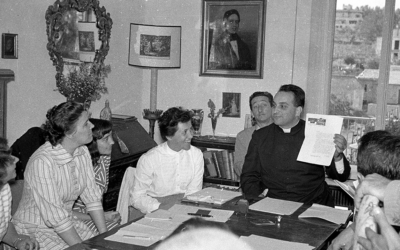This is a hymn of praise and gratitude to God. The God of Abraham, Isaac, and Jacob is the same God, Father of Jesus Christ, whom he raised from the dead. “He raised us up with him,” with Jesus, “and seated us in the heavens,” (Eph. 2:6), we who are “his handiwork” and “his body” (Eph. 2:10, 1:23).
God’s blessing on Abraham is fulfilled in Jesus (“in your descendants all the nations of the earth shall find blessing” [Gen. 22:18]).
Jesus gained the favor of the Father’s blessing, for he was clothed with that love to which the Father cannot but respond, because he is his very own Word made flesh.
He is his living Word, his Word who assumed our human nature in order to stay with us and to communicate true Life to us, to make us one body with him and to communicate his Spirit to us, through whom we can call God Father, Abba!
How can we live in a way that is worthy of the Father’s blessing? How can we draw down on ourselves that blessing which gives joy and fruitfulness to all our thoughts?
By living as sons and daughters, in the Son; by being living Word as he is. In fact, by living the Word, we are transformed into the Word, into Christ.
«Blessed be God… who has blessed us in Christ.»
The Gospel is not only a book of consolation where we can take refuge in painful moments and find answers; rather it is a code that contains the laws of life, for every moment of life; laws which should not only be read and studied, but put into practice, that is, deeply assimilated so as to live like Christ, so as to be another Christ in every moment.
In this light then, we cannot think of the Word as a pure, simple, and kind expression of human wisdom. The Word of God is much more than a message. When he speaks, he expresses himself, he gives himself. “God never gives less than himself,” recalls Augustine of Hippo (1).
And because God is Love each of his Words is love. By receiving and living the Word, we become love as God is Love.
Consequently, all our relationships – with God and with our neighbors – should change through the Word, because the Word contains a dynamic, creative power.
Living the Word brings about and develops the Christian community among people who love one another and who form only one people, the people of God.
God sends his blessing to this people, that is, to all of us, in the measure in which we treat one another as brothers and sisters in the one Father, overcoming all forms of individualism, prejudice and division.
This is what we want to do this month in which Christians in many parts of the world are joining together, as this one people, to celebrate the Week of Prayer for Christian Unity.
Aware of this gift, which we have done nothing to merit, let us try at the beginning of the third millennium to live together as living words of God.
Besides giving glory to God, our lives will be a fervent appeal for another of his gifts: that of the full and visible communion among the Churches.
Chiara Lubich
1) Enchiridion ad Laurentium de fide et spe et caritate, XII, 40, Opera omnia, XIII, 2.




0 Comments